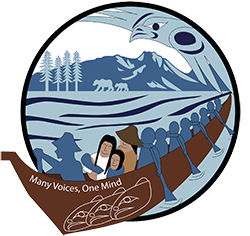Elders & Knowledge Keepers
Connecting with Elders or Knowledge Keepers
- Invitations are best made in person; however, a phone call is also an appropriate way to reach out.
- Provide a detailed agenda for the event.
- Present information that clearly states that an honorarium, compensation for travel, and other expenses will be offered. This amount can be decided based on the funds that you have available. Please do not ask the Elder how much they would like to receive.
- Offer help: carrying things, finding them a seat, offering a beverage
- If food is served, Elders should be offered or served first.
- DO NOT interrupt an Elder if they are speaking (it is helpful to allow room for flexibility in your schedule, so that anxiety levels can remain low).
- Have payment and a thank you gift ready the day of the event.
By treating Elders and Knowledge Keepers with respect from the beginning to the end of your engagement with them, we are creating and maintaining a relationship. This is accomplished by extending the invitation in a respectful way; communicating effectively throughout the process; ensuring the utmost comfort and care of the Elder or Knowledge Keeper at the event; and giving thanks to the work that has been done for the event.
Good practice is to make an offer that fits within your budget ($150.00 and up is a respectful starting point).
About Elders / Knowledge Keepers
Becoming an Elder or Knowledge Keeper typically involves a combination of age, experience, wisdom, and community recognition. In many communities, Elders and Knowledge Keepers hold esteemed positions, are responsible for passing down traditions, cultural values, historical knowledge, and practical skills to younger generations.
The process of becoming an Elder or Knowledge Keeper may vary from nation to nation, but here are some general similarities.
- Age and Experience: Elders are usually older individuals who have lived a long life and accumulated a wealth of experience and wisdom. Age alone does not make someone an Elder, but it is often a prerequisite.
- Lifelong Learning: Elders are lifelong learners who have actively sought knowledge and understanding throughout their lives. They may have gained knowledge through formal education, personal experiences, and interactions with their community.
- Community Recognition: Becoming an Elder or Knowledge Keeper is often a communal decision. The individual must be recognized and respected by their community for their wisdom, integrity, and contributions.
- Demonstration of Wisdom: Elders are expected to display wisdom in their decisions, actions, and advice. They often act as a source of guidance and support for the community members, providing insight that comes from a deep understanding of life and human nature.
- Tradition and Cultural Knowledge: Knowledge Keepers are responsible for preserving and passing down the cultural traditions, stories, and historical knowledge. They play a crucial role in ensuring that the teachings are being passed down.
- Mentorship and Teachings: Elders are often involved in mentoring and teaching younger generations. They may pass on their knowledge through storytelling, formal teachings, or practical demonstrations. Elders also serve as spiritual and moral leaders, guiding the community in matters of ethics, values, and spiritual practices.
First Nations, Metis, and Inuit Elders: are acknowledged by their respective communities as an 'Elder' through a lifetime of learned teachings and earned respect. Many communities have defined protocols and processes for becoming an Elder.
Knowledge Keepers: are people who may not be considered an Elder but carry traditional knowledge and experience in different spiritual and cultural areas.
